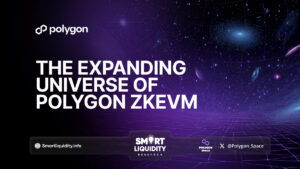Polygon CDK Goes Multistack: A New Era for Web3 Scalability and Interoperability


The blockchain space is evolving at lightning speed, and Polygon Labs is once again leading the charge. On May 7, 2025, Polygon unveiled its next major leap: a multistack version of the Polygon Chain Development Kit (CDK). This upgrade integrates the popular OP Stack—developed by Optimism—alongside native AggLayer interoperability, allowing developers to choose the tech stack that fits their needs while tapping into a unified Web3 ecosystem.
This marks a pivotal moment in the journey toward scalable, developer-friendly, and interoperable blockchain networks.
What Is Polygon CDK?
Launched in late 2023, Polygon CDK is a modular, open-source toolkit that allows developers to spin up custom Layer 2 (L2) chains powered by zero-knowledge (ZK) proofs. It’s built to scale Ethereum while retaining its security—offering flexibility for use cases ranging from gaming and DeFi to institutional finance.
Core features include:
EVM compatibility with support for Solidity and Vyper
ZK proofs for enhanced privacy and performance
Cross-chain interoperability via ZK bridges
Shared liquidity within the Polygon and Ethereum ecosystems
The CDK is already in use by major players like OKX, Astar, Immutable, and Flipkart, making it a foundational piece of Polygon 2.0’s vision: to build the “value layer of the internet.”
Introducing the Multistack CDK: Now with OP Stack
The newest iteration of CDK doesn’t just support ZK-rollups—it now allows developers to use Optimistic rollups via the OP Stack, or even mix both in hybrid configurations. This flexibility lets teams choose their preferred stack—ZK for max security, OP for low costs, or a combo of both—while still benefiting from AggLayer’s built-in interoperability.
What’s the AggLayer? It’s Polygon’s cross-chain coordination layer that ties everything together, making separate chains feel like one seamless network. With multistack support, chains built using either ZK or OP can interact natively through AggLayer—no complex bridges required.
Key Benefits of the Multistack Approach
Freedom to Choose Your Stack
Developers can build L2s that match their technical needs or business models—whether that’s speed, cost-efficiency, or regulatory compliance.Native Cross-Chain Interoperability
With AggLayer integration baked in, multistack CDK chains can easily share liquidity and state, creating a fluid, app-friendly environment.High Performance and Scalability
The OP Stack brings blazing-fast transaction throughput, and when combined with ZK tech, enables real-time dApps with high security guarantees.Strong Security Foundation
Chains settle on Ethereum and can use “pessimistic proofs” (introduced in AggLayer v0.2) to prevent malicious withdrawals, securing user funds across chain types.Open Innovation
The CDK is open-source and community-driven. New modules, like Gateway’s memory-optimizedcdk-erigonclient or Succinct’s “OP Succinct” config, continue to push the envelope.
Real Projects, Real Adoption
The multistack CDK isn’t just theory—it’s already powering major initiatives:
OKX’s X1 Network: A ZK-powered L2 connecting over 50 million users to Ethereum. With multistack, it could become even more scalable and efficient.
Flipkart’s Loyalty Program: India’s e-commerce giant is using CDK to scale Web3-based rewards.
Libre by Brevan Howard & Hamilton Lane: A custom CDK chain focused on tokenized real-world assets, proving the toolkit’s appeal to institutions.
What’s Next: Faster Finality and Full EVM Multistack
Polygon’s roadmap for AggLayer includes:
v0.3 (Q2 2025): Full multistack support for all EVM-compatible chains
v0.4 (H2 2025): Sub-5-second finality for near real-time app experiences
These upgrades will further unify the multichain world and make Web3 infrastructure feel as smooth as traditional Web apps.
Challenges Ahead
Like any ambitious tech stack, the multistack CDK brings complexity. Supporting both ZK and optimistic rollups introduces integration and security challenges, and hybrid configurations can raise the bar for developer expertise.
However, Polygon is addressing this through:
Rich documentation
Support from partners like Zeeve, Gateway, and Succinct Labs
A growing community of developers contributing improvements and feedback
Final Thoughts: Building the Broadband of Web3
As Sandeep Nailwal, Polygon’s co-founder, put it: this is the “broadband moment” for Web3—removing infrastructure bottlenecks so that builders can create better apps, faster and at scale.
The multistack CDK gives developers unmatched control and flexibility, while ensuring the user experience remains fast, secure, and connected. For users, this means seamless interaction across chains; for developers, it’s a playground for the next wave of Web3 innovation.
REQUEST AN ARTICLE
Disclaimer:
This article is for informational purposes only and does not constitute financial advice. Readers are encouraged to conduct their own research and consult with a financial professional before making any investment decisions.




